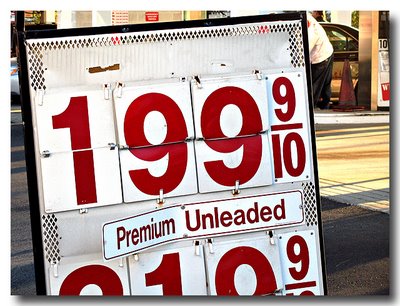Thursday, October 26, 2006
Economic Miracle?... (yawn)
 Yesterday morning, I filled up the tank on the way to work for $1.999/gallon, the first time I've paid under $2/gallon since... I can't remember. I was so excited that afterwards, I parked my car nearby and walked back to document the sign.
Yesterday morning, I filled up the tank on the way to work for $1.999/gallon, the first time I've paid under $2/gallon since... I can't remember. I was so excited that afterwards, I parked my car nearby and walked back to document the sign. This morning, as I passed that same intersection, I noticed that one of the three gas stations was still at $1.999, while the one on the other side of the street now advertised $1.998.
The Dow Jones Industrial Average, after breaking its old 1999 record and punching through 12,000 last week, continues to advance. At work, it seems as if new people are being hired at high-paying jobs every week, and in downtown Baltimore, skyscraping buildings are going up everywhere.
Now maybe I don't live in Detroit or Cleveland, but in these parts, the economy sure looks good and seems to be getting better.
And yet, all you hear about is people complaining about how bad the economy is.
I have a theory about that, and it goes like this:
For some time now, even as we've been getting wealthier and raising our standard of living, there have been structural changes in the economy, inlcuding the "social compact" between employers and employees, all of which have introduced opportunities, for sure, but also a measure of risk and uncertainty for workers.
Much of this is the change to a global economy. It's a good-news/bad-news sort of thing (or, if you're more optimistic like me, a bad-news/good-news thing.)
Way back int the mid-90's, President Clinton told us, like a latter-day Bob Dylan, that the times they were a-changin'. It wasn't a bad thing, he said, but rather an opportunity. But it meant that people would have to take more responsibility for their lives and be more self-directed. Above all, he emphasized the need for lifelong learning, in order to stay competitive in the job market. He predicted, quite rightly, that the days of working for a single company for an entire career were past, and that people needed to become prepared and flexible in the changing workplace.
The popularity and proliferation of 401K programs, a great opportunity for employees, came at the same time that many companies no longer offered traditional, defined-benefit pension plans. In other words, the companies weren't going to look out for you, you would have to look out for yourself.
Now 401K's proved to be a classic good-news/bad-news thing. Good in the 90's as the stock market ran up incredible gains, but then bad from 2000 on as the bubble burst and trillions went up in smoke. But now good news again, as the market has recovered nicely, this time, with gains coming much more slowly, but built on real value, rather than smoke and mirrors as in the late '90s.
Oil prices began to surge by 2005. Now this was definitely a bad-news/good-news thing, but few could see (or were willing to see) what it was all about. The chatter in the public square was all about consipracies and price-gouging, but in fact, what was behing the price rise was, if you care about the human rights and the condition of the Third World, good news. No, wonderful news.
And that was that a few hundred million people in India and a few hundred million more in China had, thanks to the new global economy and (gulp!) capitalism moved from abject poverty to middle-class lives. And guess what, those five or six or seven hundred million new middle-classers have left their oxcarts and bicycles behind and are now consuming... gasoline!
And as we know, nobody, not even Stalin nor Mao, has ever figured out how to repeal the Law of Supply and Demand, so oil prices went up.
Since then, the higher oil prices encourgaged companies to explore for and drill for more oil and build more refinery capacity, and what do you know... the price of gas has come back down. Fallen like a lead brick, is more like it.
The conventional wisdom during this election season is that the economy is in bad shape, but I, for one, don't buy it.
The real issue is that those of us who work for a living are now faced with new issues and realities that introduce more economic risk into our lives. To put it in simple terms, we're not getting poorer, we may even be getting richer, but we're definitely getting more nervous.



